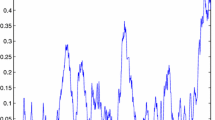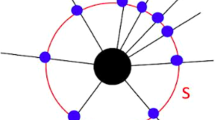Abstract
We consider the class of closed generic fluid network (GFN) models, which provides an abstract framework containing a wide variety of fluid networks. Within this framework a Lyapunov method for stability of GFN models was proposed by Ye and Chen. They proved that stability of a GFN model is equivalent to the existence of a functional on the set of paths that is decaying along paths. This result falls short of a converse Lyapunov theorem in that no state-dependent Lyapunov function is constructed. In this paper we construct state-dependent Lyapunov functions in contrast to path-wise functionals. We first show by counterexamples that closed GFN models do not provide sufficient information that allow for a converse Lyapunov theorem. To resolve this problem we introduce the class of strict GFN models by forcing closed GFN models to satisfy a concatenation and a semicontinuity condition. For the class of strict GFN models we define a state-dependent Lyapunov function and show that a converse Lyapunov theorem holds. Finally, it is shown that common fluid network models, like general work-conserving and priority fluid network models as well as certain linear Skorokhod problems define strict GFN models.
Similar content being viewed by others
References
Aubin, J.P.: Viability Theory. Systems & Control: Foundations & Applications. Birkhäuser, Boston (1991)
Aubin, J.P., Frankowska, H.: Set-Valued Analysis. Modern Birkhäuser Classics. Birkhäuser, Boston (2009)
Bacciotti, A., Rosier, L.: Lyapunov Functions and Stability in Control Theory, 2nd edn. Communications and Control Engineering. Springer, Berlin (2005)
Bernard, A., El Kharroubi, A.: Régulations déterministes et stochastiques dans le premier “orthant” de ℝn. Stoch. Stoch. Rep. 34, 149–167 (1991)
Bramson, M.: Instability of FIFO queueing networks. Ann. Appl. Probab. 4(2), 414–431 (1994)
Bramson, M.: Stability of Queueing Networks. Lecture Notes in Mathematics, vol. 1950. Springer, Berlin (2008)
Chen, H.: Fluid approximations and stability of multiclass queueing networks: Work-conserving disciplines. Ann. Appl. Probab. 5(3), 637–665 (1995)
Chen, H.: A sufficient condition for the positive recurrence of a semimartingale reflecting Brownian motion in an orthant. Ann. Appl. Probab. 6(3), 758–765 (1996)
Chen, H., Ye, H.: Piecewise linear Lyapunov function for the stability of multiclass priority fluid networks. IEEE Trans. Autom. Control 47(4), 564–575 (2002)
Chen, H., Zhang, H.: Stability of multiclass queueing networks under FIFO service discipline. Math. Oper. Res. 22(3), 691–725 (1997)
Chen, H., Zhang, H.: Stability of multiclass queueing networks under priority service disciplines. Oper. Res. 48(1), 26–37 (2000)
Clarke, F., Ledyaev, Y., Stern, R.: Asymptotic stability and smooth Lyapunov functions. J. Differ. Equ. 149(1), 69–114 (1998)
Dai, J.: On positive Harris recurrence of multiclass queueing networks: A unified approach via fluid limit models. Ann. Appl. Probab. 5(1), 49–77 (1995)
Dai, J.: A fluid limit model criterion for instability of multiclass queueing networks. Ann. Appl. Probab. 6(3), 751–757 (1996)
Dai, J.: Stability of fluid and stochastic processing networks. MaPhySto, Miscellanea, No. 9, Centre for Mathematical Physics and Stochastics, University of Aarhus, Denmark (1999)
Dai, J., Lin, W.: Maximum pressure policies in stochastic processing networks. Oper. Res. 53(2), 197–218 (2005)
Dai, J., Lin, W.: Asymptotic optimality of maximum pressure policies in stochastic processing networks. Ann. Appl. Probab. 18(6), 2239–2299 (2008)
Dai, J., Hasenbein, J.J., Vande Vate, J.H.: Stability and instability of a two-station queueing network. Ann. Appl. Probab. 14(1), 326–377 (2004)
Dai, J., Hasenbein, J.J., Kim, B.: Stability of join-the-shortest-queue networks. Queueing Syst. 57(4), 129–145 (2007)
Dupuis, P., Williams, R.J.: Lyapunov functions for semimartingale reflecting Brownian motions. Ann. Probab. 22(2), 680–702 (1994)
El Kharroubi, A., Ben Tahar, A., Yaacoubi, A.: On the stability of the linear Skorokhod problem in an orthant. Math. Methods Oper. Res. 56, 243–258 (2002)
Ethier, S.N., Kurtz, T.G.: Markov Processes. Characterization and Convergence. Wiley Series in Probability and Mathematical Statistics (1986)
Filippov, A.F.: On certain questions in the theory of optimal control. J. Soc. Ind. Appl. Math., Ser. A Control 1, 76–84 (1962)
Hale, J.K., Verduyn Lunel, S.M.: Introduction to Functional Differential Equations. Applied Mathematical Sciences, vol. 99. Springer, New York (1993)
Hinrichsen, D., Pritchard, A.J.: Mathematical Systems Theory I. Modelling, State Space Analysis, Stability and Robustness. Texts in Applied Mathematics, vol. 48. Springer, Berlin (2005)
Kellett, C.M., Teel, A.R.: Smooth Lyapunov functions and robustness of stability for difference inclusions. Syst. Control Lett. 52(5), 395–405 (2004)
Kumar, P., Seidman, T.I.: Dynamic instabilities and stabilization methods in distributed real-time scheduling of manufacturing systems. IEEE Trans. Autom. Control 35(3), 289–298 (1990)
Pukhalski, A.A., Rybko, A.N.: Nonergodicity of queueing networks when their fluid models are unstable. Probl. Pereda. Inf. 36, 26–46 (2000)
Robert, Ph.: Stochastic Networks and Queues. Applications of Mathematics, vol. 52. Springer, Berlin (2003)
Rybko, A.A., Stolyar, A.L.: Ergodicity of stochastic processes describing the operation of open queueing networks. Probl. Inf. Transm. 28(3), 199–220 (1992)
Schönlein, M.: Stability and robustness of fluid networks: A Lyapunov perspective. Ph.D. Thesis, University of Würzburg, Germany (2012)
Smirnov, G.V.: Introduction to the Theory of Differential Inclusions. Graduate Studies in Mathematics, vol. 41. AMS, Providence (2002)
Stolyar, A.L.: On the stability of multiclass queueing networks: A relaxed sufficient condition via limiting fluid processes. Markov Process. Relat. Fields 1(4), 491–512 (1995)
Teel, A., Praly, L.: A smooth Lyapunov function from a class-\(\mathcal{KL}\) estimate involving two positive semidefinite functions. ESAIM Control Optim. Calc. Var. 5, 313–367 (2000)
Ye, H.Q., Chen, H.: Lyapunov method for the stability of fluid networks. Oper. Res. Lett. 28(3), 125–136 (2001)
Author information
Authors and Affiliations
Corresponding author
Additional information
This research was funded by the Volkswagen Foundation under grant I/83 087.
Rights and permissions
About this article
Cite this article
Schönlein, M., Wirth, F. On converse Lyapunov theorems for fluid network models. Queueing Syst 70, 339–367 (2012). https://doi.org/10.1007/s11134-012-9279-9
Received:
Published:
Issue Date:
DOI: https://doi.org/10.1007/s11134-012-9279-9




